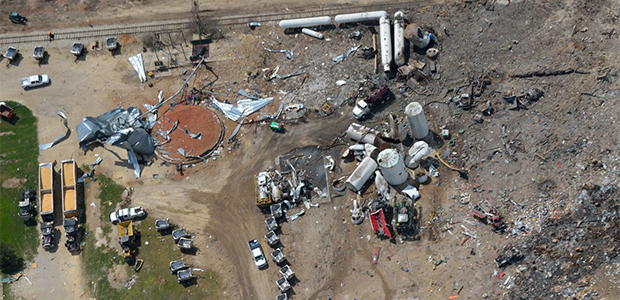
CSB's West Recommendations Coming Jan. 28
The safety board has a public meeting scheduled from 6-9 p.m. in Waco, Texas, near the explosion site.
The U.S. Chemical Safety Board is holding a public meeting Jan. 28 in Waco, Texas, to present its investigation report and safety recommendations from the April 17, 2013, ammonium nitrate (AN) fire and explosion at the West Fertilizer facility in the nearby town of West. The meeting at the Hilton Waco is scheduled to last from 6 to 9 p.m.
Fifteen people died in the massive explosion, 12 of whom were firefighters attempting to quench the fire when 30 tons of stored AN exploded. More than 260 people who were injured were treated at local hospitals, and off-site damage has been estimated at more than $100 million, according to CSB, which describes the West Fertilizer explosion as one of the most destructive incidents it has ever investigated. A middle school and a two-story apartment building located near the storage facility were heavily damaged.
At the meeting, the board will hear a presentation from CSB's investigative staff on their draft investigation report and related safety recommendations, and the board also will also hear comments from the community. At the conclusion of the staff presentation, the board members may vote on the final report.
"The CSB looks forward to the completion of the investigation into this tragic accident. By sharing the lessons learned from the West Fertilizer investigation, we will, among other items, raise of awareness of hazards associated with the storage of ammonium nitrate to help prevent similar accidents in the future. The board looks forward to sharing its findings and hearing from the public," CSB Chairperson Vanessa Allen Sutherland said.
The meeting is free and open to the public. Pre-registration is not required, but to ensure adequate seating attendees are strongly encouraged to pre-register by emailing their names and affiliations to [email protected]. The meeting also will be webcast live; details will be available soon at www.csb.gov.
Last year, the National Fire Protection Association published the 2016 edition of NFPA 400, its Hazardous Materials Code, which contains a revised Chapter 11 with significant changes for the design, construction, and fire suppression systems of new facilities built to house ammonium nitrate.